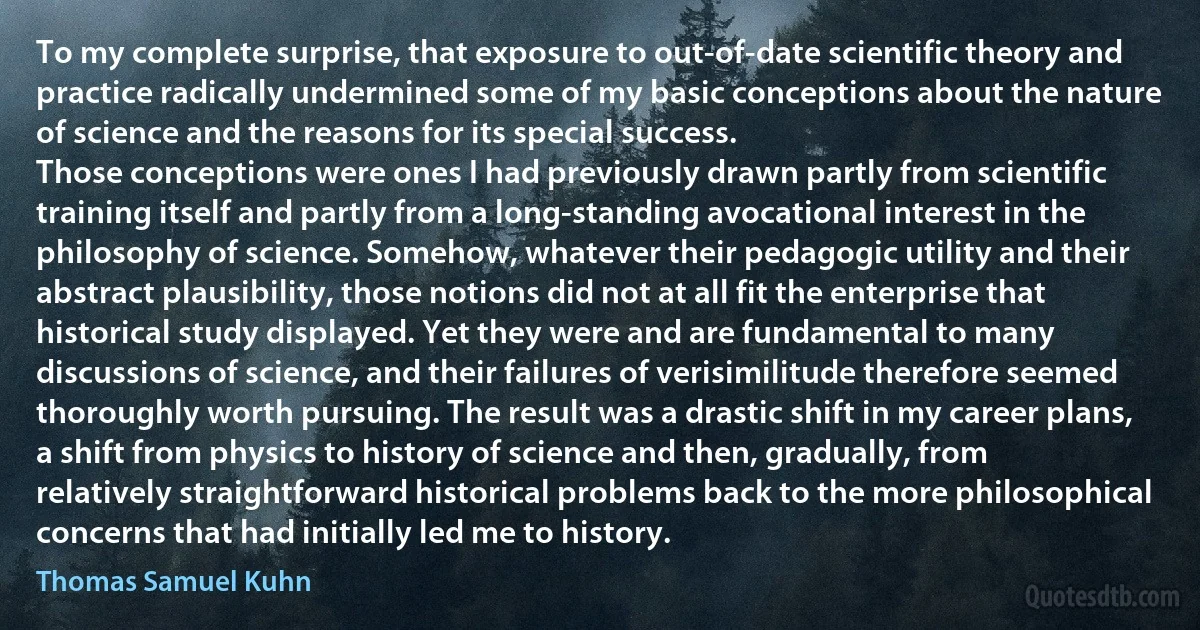Practice Quotes - page 25
The change of religion in Scotland, eager and vehement as it was, raised an epidemical enthusiasm, compounded of sullen scrupulousness and warlike ferocity, which, in a people whom idleness resigned to their own thoughts, and who conversing only with each other, suffered no dilution of their zeal from the gradual influx of new opinions, was long transmitted in its full strength from the old to the young, but by trade and intercourse with England, is now visibly abating, and giving way too fast to their laxity of practice and indifference of opinion, in which men, not sufficiently instructed to find the middle point, too easily shelter themselves from rigour and constraint.

Samuel Johnson
What Elizabethan playwrights learned from the Greek classics was not theories of insanity, but dramatic practice - that is, madness is a dandy theatrical element. It focuses the audience's attention and increases suspense, since you never know what a mad person may get up to next; and Shakespeare himself makes use of it in many forms. In King Lear, there's a scene in which one man pretending to be mad, another who has really gone mad, and a third who has probably always been a little addled, are brought together for purposes of comparison, irony, pathos, and tour de force acting. In Hamlet, there are two variations - Hamlet himself, who assumes madness, and Ophelia, who really does go winsomely bonkers. In MacBeth, it's Lady MacBeth who snaps.

Margaret Atwood
Men whose research is based on shared paradigms are committed to the same rules and standards for scientific practice. That commitment and the apparent consensus it produces are prerequisites for normal science, i. e., for the genesis and continuation of a particular research tradition.

Thomas Samuel Kuhn
Somehow, the practice of astronomy, physics, chemistry or biology normally fails to evoke the controversies over fundamentals that today seem endemic among, say, psychologists or sociologists. Attempting to discover the source of that difference led me to recognize the role in scientific research of what I have since called "paradigms.” These I take to be universally recognized scientific achievements that for a time provide model problems and solutions for a community of practitioners.

Thomas Samuel Kuhn
These examples point to the third and most fundamental aspect of the incommensurability of competing paradigms. In a sense that I am unable to explicate further, the proponents of competing paradigms practice their trades in different worlds. One contains constrained bodies that fall slowly, the other pendulums that repeat their motions again and again. In one, solutions are compounds, in the other mixtures. One is embedded in a flat, the other in a curved, matrix of space. Practicing in different worlds, the two groups of scientists see different things when they look from the same point in the same direction. Again, that is not to say that they can see anything they please. Both are looking at the world, and what they look at has not changed. But in some areas they see different things, and they see them in different relations one to the other. That is why a law that cannot even be demonstrated to one group of scientists may occasionally seem intuitively obvious to another.

Thomas Samuel Kuhn
To a few alarmed observers it seemed as though Wall Street were by way of devouring all the money of the entire world. However, in accordance with the cultural practice, as the summer passed, the sound and responsible spokesmen decried not the increase in brokers' loans, but those who insisted on attaching significance to this trend.

John Kenneth Galbraith
This Government have lived on electoral bribes for six years. They have been floating helplessly down the revolutionary stream, which they have not controlled or guided in any way, snatching now at one electoral advantage and now at another electoral advantage. They have attacked the Crown, they have attacked the Second Chamber, they have bound the Representative Chamber hand and foot; and, having finished their bribes, they are now lapsing into the old Radical practice of destroying Churches, passing what they conceive to be judicious Reform Bills from the gerrymandering point of view, and generally comporting themselves as a Radical Party in difficulties always does comport itself. I do not believe the country will stand it much longer.

Arthur Balfour
My sole occupation is love.
All my occupation now is the practice of the love of God, all the powers of soul and body, memory, understanding, and will, interior and exterior senses, the desires of spirit and of sense, all work in and by love. All I do is done in love; all I suffer, I suffer in the sweetness of love.

John of the Cross
Hypocrisy, double standards, and "but nots" are the price of universalist pretensions. Democracy is promoted, but not if it brings Islamic fundamentalists to power; nonproliferation is preached for Iran and Iraq, but not for Israel; free trade is the elixir of economic growth, but not for agriculture; human rights are an issue for China, but not with Saudi Arabia; aggression against oil-owning Kuwaitis is massively repulsed, but not against non-oil-owning Bosnians. Double standards in practice are the unavoidable price of universal standards of principle.

Samuel P. Huntington
If the coup victories so we can look forward to a long conflict because we refuse to bend. We are not afraid of their guns. Honduras army pattern just 7000 men. If we take up arms, we would quickly run away so few soldiers. But our goal is to allocate the regime in a peaceful and honorable way. Women, children, youth, students, workers - we all have united us in a civic front against the coup. Even my 80 year old mother to the streets and practice non-violent resistance.

Manuel Zelaya
Grammar is the mistress of words, the embellisher of the human race; through the practice of the noble reading of ancient authors, she helps us, we know, by her counsels. The barbarian kings do not use her; as is well known, she remains unique to lawful rulers. For the tribes possess arms and the rest; rhetoric is found in sole obedience to the lords of the Romans.

Cassiodorus
I then follow up with four major aspects of economic research in the last 60 years, the period of my scholarly activity. One, econometric methodology and practice, is of such fundamental importance that it cannotgo unnoticed, although I played no role in it. With the other three, general equilibrium, dynamic processes, and uncertainty and information, I was more intimately involved.

Kenneth Arrow
However intimate we may be with the operations of the mind, we cannot think more than two or three minutes a day; - unless, by taste or by profession, we practice, for hours on end, brutalizing words in order to extract ideas from them. The intellectual represents the major disgrace, the culminating failure of Homo sapiens.

Emil Cioran



